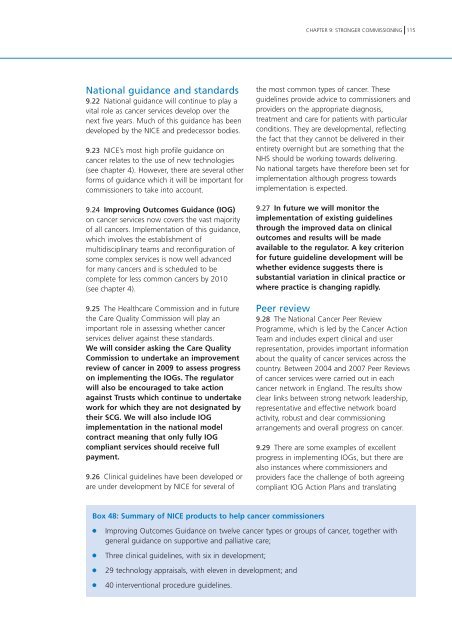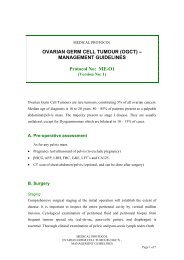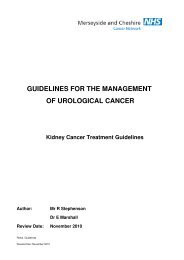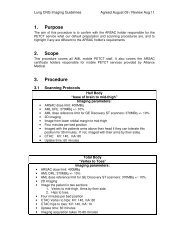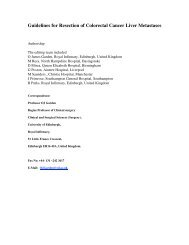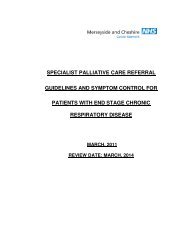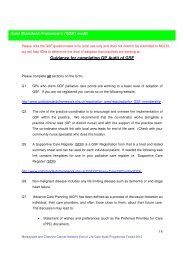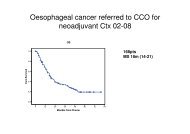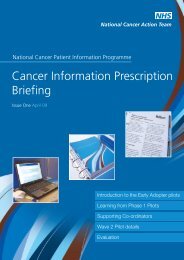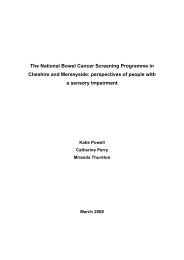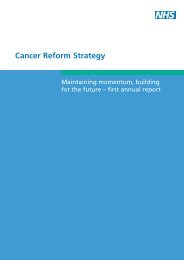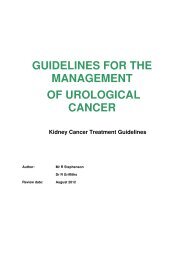Cancer Reform Strategy - NHS Cancer Screening Programmes
Cancer Reform Strategy - NHS Cancer Screening Programmes
Cancer Reform Strategy - NHS Cancer Screening Programmes
- No tags were found...
You also want an ePaper? Increase the reach of your titles
YUMPU automatically turns print PDFs into web optimized ePapers that Google loves.
CHAPTER 9: STRONGER COMMISSIONING 115National guidance and standards9.22 National guidance will continue to play avital role as cancer services develop over thenext five years. Much of this guidance has beendeveloped by the NICE and predecessor bodies.9.23 NICE’s most high profile guidance oncancer relates to the use of new technologies(see chapter 4). However, there are several otherforms of guidance which it will be important forcommissioners to take into account.9.24 Improving Outcomes Guidance (IOG)on cancer services now covers the vast majorityof all cancers. Implementation of this guidance,which involves the establishment ofmultidisciplinary teams and reconfiguration ofsome complex services is now well advancedfor many cancers and is scheduled to becomplete for less common cancers by 2010(see chapter 4).9.25 The Healthcare Commission and in futurethe Care Quality Commission will play animportant role in assessing whether cancerservices deliver against these standards.We will consider asking the Care QualityCommission to undertake an improvementreview of cancer in 2009 to assess progresson implementing the IOGs. The regulatorwill also be encouraged to take actionagainst Trusts which continue to undertakework for which they are not designated bytheir SCG. We will also include IOGimplementation in the national modelcontract meaning that only fully IOGcompliant services should receive fullpayment.9.26 Clinical guidelines have been developed orare under development by NICE for several ofthe most common types of cancer. Theseguidelines provide advice to commissioners andproviders on the appropriate diagnosis,treatment and care for patients with particularconditions. They are developmental, reflectingthe fact that they cannot be delivered in theirentirety overnight but are something that the<strong>NHS</strong> should be working towards delivering.No national targets have therefore been set forimplementation although progress towardsimplementation is expected.9.27 In future we will monitor theimplementation of existing guidelinesthrough the improved data on clinicaloutcomes and results will be madeavailable to the regulator. A key criterionfor future guideline development will bewhether evidence suggests there issubstantial variation in clinical practice orwhere practice is changing rapidly.Peer review9.28 The National <strong>Cancer</strong> Peer ReviewProgramme, which is led by the <strong>Cancer</strong> ActionTeam and includes expert clinical and userrepresentation, provides important informationabout the quality of cancer services across thecountry. Between 2004 and 2007 Peer Reviewsof cancer services were carried out in eachcancer network in England. The results showclear links between strong network leadership,representative and effective network boardactivity, robust and clear commissioningarrangements and overall progress on cancer.9.29 There are some examples of excellentprogress in implementing IOGs, but there arealso instances where commissioners andproviders face the challenge of both agreeingcompliant IOG Action Plans and translatingBox 48: Summary of NICE products to help cancer commissioners●●●●Improving Outcomes Guidance on twelve cancer types or groups of cancer, together withgeneral guidance on supportive and palliative care;Three clinical guidelines, with six in development;29 technology appraisals, with eleven in development; and40 interventional procedure guidelines.


